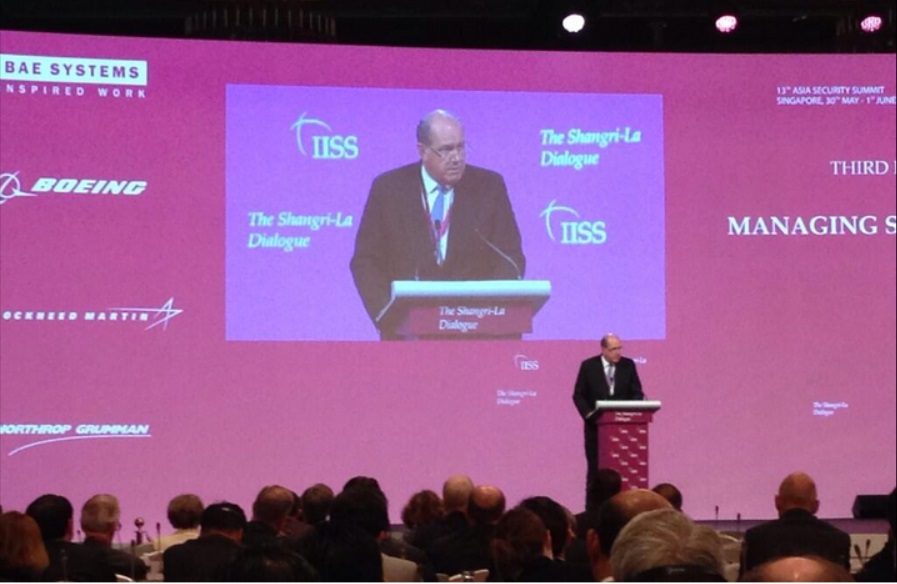 The Australian Defence Minister thinks Asia’s security situation is potentially ‘dire’ even ‘catastrophic’. But David Johnston twice assured his Shangri-La audience that the regional impact of the US marines rotating through Darwin on the strategic balance is ‘zero’. Strange times, indeed.
The Australian Defence Minister thinks Asia’s security situation is potentially ‘dire’ even ‘catastrophic’. But David Johnston twice assured his Shangri-La audience that the regional impact of the US marines rotating through Darwin on the strategic balance is ‘zero’. Strange times, indeed.
The Senator’s prepared text saw Australia stand shoulder to shoulder with the US and Japan on the threat to law and regional order posed by China. Yet his tone and some of his positioning—especially on the US marines—had a distinctly ASEAN flavour. In culinary terms, this was roast beef and veg served with soy and chilli sauce.
Australia has sent its Defence Minister to every Asia Security Summit (sharing that honour with Japan). I’ve heard most of those speeches and read them all and Johnston’s effort had some of the darker and sharper edges; the 13th Shangri-La dialogue prompts some superstitious reflections on that unlucky number..
Johnston offered a prepared speech that was entirely consistent with the previous efforts by the Japanese Prime Minister and the US Defense Secretary. First the setup, with the plea for respect for international law, unimpeded trade and freedom of navigation, then the dark stuff:
The use of force or coercion to unilaterally alter the status quo in the East China Sea and South China Sea is not acceptable. … Any breakdown in security, through miscalculation or actions that run contrary to the general principles of international law and the free flow of goods and services through the region would be catastrophic for all our nations. It would have dire consequences for the economic prosperity of the region.
The reason the Australian Defence Minister makes the Shangri-La pilgrimage every year is the opportunity, in the space of a couple of days, to do quality time with the US Defence Secretary, ASEAN ministers, and his counterparts from Japan, India, Korea and perhaps even one of the Europeans. This year, Johnston shared his session on ‘Managing Strategic Tensions’ with the Defence Ministers of Indonesia and Vietnam. All the ASEAN interaction might be altering the Australian style (this is offered only half in jest).
Midway through the Defence Minister’s speech, Nick Bisley tweeted, ‘Johnston’s delivery rather plodding. Bit more energy please’. Professor Nick is a tough marker who obviously doesn’t spend much time watching the Australian Senate in action. Another way of marking the speech would be to say that in the 40th anniversary year of Australia becoming an ASEAN dialogue partner, the Australian Defence Minister can occasionally match the tone and even some of the content of an ASEAN Defence Minister. Doing chilli with your roast beef isn’t an easy trick but Australia tries.
Johnston’s words about the centrality of ASEAN were straight out of the Southeast Asian play-book and his answers to questions reinforced that thought. In each of the two rounds of questions, Johnston was asked about the role of the US marines in Darwin. The first question, from an Indonesian, was on the reason for the marine deployment and its relationship to the rebalance. The Senator gave the training-not-bases answer: ‘There is no sovereignty or basing of US marines in Australia. Australia owns all of the facilities. We share them with the marines. Most of you are aware that space is something Australia has a lot of. Compared to Okinawa or Guam we have a comparative advantage’. Singapore uses a version of the same argument—we have a wonderful position and all those US ships are rotating through, not basing.
One point in Johnston’s answer that had some in the audience scratching their head was his comment that while the US sends 1100 marines to Oz, other countries have even more military on Australian soil.
Johnston didn’t use the figure, but Singapore has—at times— up to 4000 personnel in Australia, doing such things as armour training at Shoalwater Bay in Queensland and pilot training in Western Australia. It’s not a figure the Singaporeans like to broadcast, so Johnston was showing his ASEAN credentials by refraining from using it; mustn’t embarrass the hosts.
The second question on the marines received an equally ASEAN-like answer. What was the positive or negative impact on the regional strategic balance of the rotation of the US troops? Johnston’s short answer, offered twice, was ‘zero’. His reasoning is that logistics and the distances involved in getting the marines to Oz takes them out of the equation:
So there they are, half way down the Northern Territory to central parts of Australia—doing their exercises, doing their training, inter-operating with Australia, and that’s what’s happening. So with respect to that question—I think that’s a good question—I’m very happy to say the regional strategic impact of those forces in Darwin is zero’.
Graeme Dobell is the ASPI journalist fellow. He has been reporting from the 2014 Shangri-La Dialogue. Image courtesy of ASPI’s Tobias Feakin.

